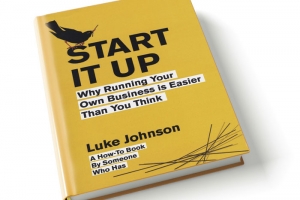 “Business is a fantastic technique for someone from a modest background, with minimal education, to improve their life and get ahead”, says Luke Johnson in his book Start It Up. His publishers describe Johnson as “Britain’s busiest tycoon, with a personal fortune estimated at £120 million” and he believes in people with get up and go and that small business owners contribute a great deal to the UK economy.
“Business is a fantastic technique for someone from a modest background, with minimal education, to improve their life and get ahead”, says Luke Johnson in his book Start It Up. His publishers describe Johnson as “Britain’s busiest tycoon, with a personal fortune estimated at £120 million” and he believes in people with get up and go and that small business owners contribute a great deal to the UK economy.
Start It Up, published by Portfolio Penguin, price £12.99, is aimed at inspiring and guiding budding entrepreneurs. How old are such entrepreneurs? Read the book and you realise Johnson has the 50 plus age group just as much in mind as people in their 20s. Independent shopkeepers will find this book useful for two reasons. You can compare your strengths and weaknesses with those described by Johnson. And you can learn about the people you do business with, what motivates them and what they may be thinking. It is organised into seven parts and each part is sub divided into short essays on various themes. For example, on page 138 he explains the “five questions I ask myself before investing.” They are quite simple questions and they can be used in three ways. Firstly, you can use them to honestly assess your own strengths and weaknesses. Second, you can use them to assess your business and to see it as an outside investor might. Third, you can use them to frame any business plan you put together to justify further capital investment.
Johnson is a man who loves reading. He writes a column in the FT that is occasionally brilliant. He sprinkles his book with great quotes and with his opinion. What the book does not do is provide rigorous evidence for why his opinions matter. If you are not used to reading business books, this is a strength. It makes his ideas more accessible. In his section on getting funding he promotes angel investors and advises people that a good investor will “bring a multi-layered network of contacts and be able to offer advice on strategy, recruitment and potential customers.”
With his background in the casual dining business, most of Johnson’s business ideas are easily transferable to the convenience sector. He warns that good ideas are soon copied by the market, reducing prices and increasing costs. When he took over Pizza Express, good sites were plentiful, competition was limited and the public was reading to spend on eating out. In the 1990s “even a relative amateur like me could grow a business enjoying 20 per cent unit margins and cash returns well over 35 per cent”. Today, returns are lower and unlikely to recover.
Johnson is lukewarm on franchises, saying “if you rent someone else’s idea, then you do not control your own destiny” and speaks warmly of independent operators. “I like the individuality of an owner-managed organisation. I want a merchant I patronise to have character, not to be a faceless entity.” But this book does not explore these themes relentlessly.
Instead buy it for his celebration of the get up and go drive of entrepreneurs and his advice on how to network and build partnerships; how to get to know the people who drive your business and why this is in the public good. Enjoy it also as a great source of business quotes. Buy it also to find out about the Money Riverbank. “The Money River really is out there, for those who would only stand in it,” Johnson writes.





Comments
This article doesn't have any comments yet, be the first!